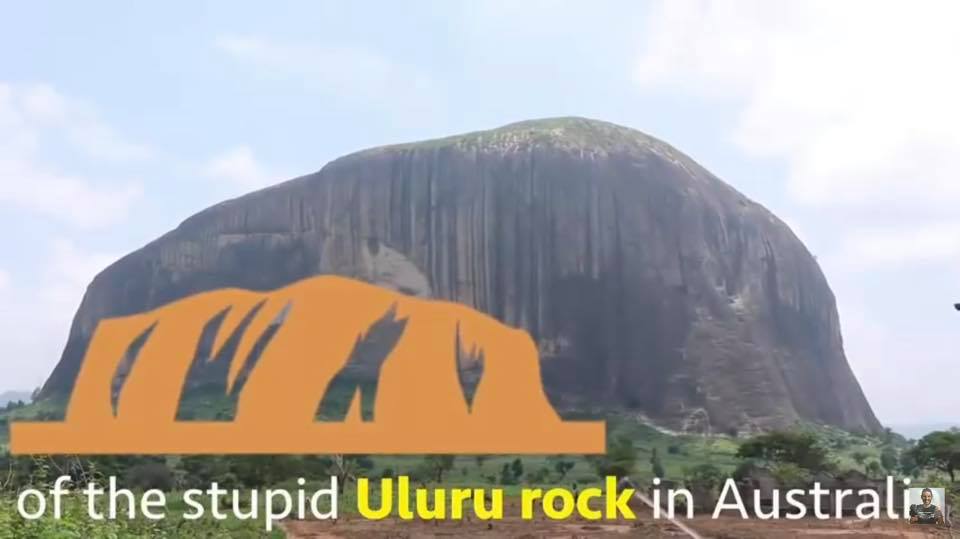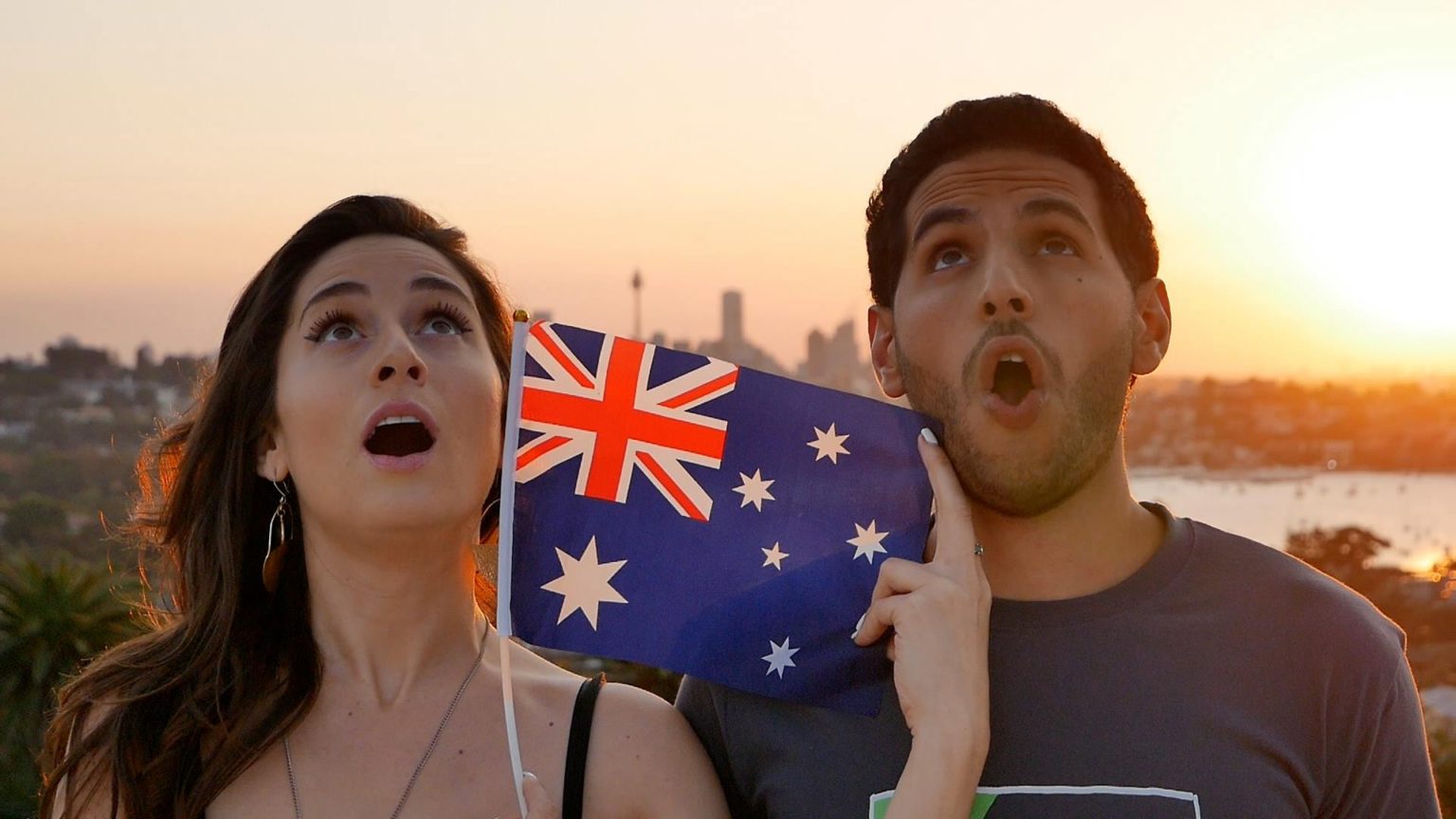Usually I don’t pay much attention to Nas Daily, an Arab-Israeli Vlogger, because after seeing many of his videos on Palestine, it became very clear to me and many of us Palestinians that he is more interested in bargaining with the world for our humanity despite the material costs rather than engaging in any kind of awareness-raising or resistance.
But I can’t keep ignoring him while he is in Australia making voyeuristic videos about Indigenous culture; in the country where I reside as a migrant settler with all my settler privilege, where as an Indigenous Palestinian person, I have found myself living on another stolen land, another settler-colonial entity.
Like Nas Daily, aka Nuseir Yassin, when I first arrived in Australia I also thought this was just a white nation; a nation of Vegemite, farmland and short Aussie slang, as he has selectively shown us in his latest videos. Later I began wondering why I never encountered Aboriginal or Torres Strait Islander people at school, or on our road trips. I didn’t know much about the custodians of the land I’d settled on.
But unlike Yassin, who supposedly is a mature, professional and experienced Harvard graduate, I arrived in Australia aged 11 and had only encountered the country through cartoons and Steve Irwin shows.
I had little physical, linguistic or cognitive access as a migrant child from Jordan to the widely documented dispossession, oppression and genocide that happened and continues to happen on this land while White Australia tries to pretend there’s no suffering and no harm caused by genocidal policies and exploitation, as seen on Sunrise just earlier this year.
Most importantly, I did not have a global audience of millions tuning into nicely compiled one-minute videos marketed as informative for the First World to consume.
Nas lacks the legitimacy to represent ‘these people’
It takes many years of learning and unlearning to recognise and understand how racism operates in this country, and how multiculturalism works as an oppressive structure that furthers white supremacy; time that Yassin clearly believes is unnecessary.

Non-Indigenous Australians and non-Australians don’t just happen to come to know about anti-Indigenous racism in Australia. It takes many years of learning before we, as non-Aboriginal or Torres Strait Islander people, can start working with questions related to Aboriginal and Torres Strait Islander cultures or history. Many years that still do not grant us any authority or legitimacy to centre ourselves in discussion of First Nations issues, because First Nations movements are leading the way. We need to recognise that speaking about oppressed peoples’ experiences requires respect, sensitivity and accuracy, and that these experiences should not be made into mockery through negligent compilations by a tourist with a camera, as Yassin does.
As a migrant settler, I was taught the many horrific facts around Australia’s colonial history through years of existing and becoming politicised in this country, facts that Yassin negligently, harmfully erases through his Nas Daily videos. Yet, this is not new to the Nas Daily approach.
Nas irresponsibly appropriates cultures and places
Nas is simply interested in appropriating the ‘fascinating’, as he describes Aboriginal and Torres Strait Islander ancestry, to create videos for knowledge consumption. I say ‘knowledge consumption’ because it is important to note that Yassin’s videos are appealing to viewers not just because they are fun, but because they indulge us in a self-actualisation project as informed, cosmopolitan, global, hipsters full of wanderlust; each category extensively problematised by critical sociologists for its reinforcement of neo-liberal ideology.
When we look at Yassin’s work, as childishly as it presents itself, we should not ignore his role as a producer with accountability not only to his audiences, but to the stories he tells, and the people he claims to represent. It seems that the critique against the infantilisation of powerful men like Zuckerberg (and other men proximating whiteness) is relevant here, since as grown men they seem to be able to assail responsibility from harmful political consequences.
They hide behind “intention” and goodwill, as Yassin does in his follow-up video complaining that some commentators called him out for using the term ‘these people’ in reference to First Nations peoples, clearly disregarding the negative effects his work and words can have on marginalised communities.
Nas uses words to speak over and erase the oppressed
Yassin’s response video is even more problematic than the first; if one is not familiar with his consistent whitewashing of oppression, one could excuse the first video as a product of ignorance and misinformation.
However, his smug, dismissive second video clearly taps into the ‘free speech’ cries of the right-wing that have become very familiar. He starts by saying he believes political correctness is important (and let’s not even get into how problematic the concept of ‘political correctness’ is) before going on to dismiss the voices of those who called on him to be more cautious and respectful, asking them to carry the burden of figuring out his intent.
Well-known Palestinian academic Steven Salaita wrote a piece against Yassin’s Zionist practices and the discourse he espouses in his videos in an article for Mondoweiss: ‘In video tours of Palestine, Nas Daily plays native informant’.
Salaita notes that Yassin’s videos are understandably popular amongst first-world youth driving the internet: “It’s easy to see why Yassin has been successful. He is jaunty and vivacious. His videos are colorful [sic] and fast-paced, offering hopeful messages that resonate in a seemingly broken world. He seeks the exotic and unusual, which plays well with First World audiences”.
What’s critical in this analysis is the highlighting of Yassin’s attempts to appeal to ‘First World audiences’, as this project itself positions him to speak to a whiteness that is so normative it appears neutral and invisible, possibly even to Yassin.
In his piece, Salaita argues that Yassin’s efforts ultimately normalise Israel rather than critique ‘both sides’ as he claims:
In an otherwise decent video about Palestinians inside Israel, he implies that “the laws [in Israel] don’t explicitly discriminate.” Yet numerous writers and civic organizations have documented Israel’s juridical discrimination against non-Jewish minorities. Yassin then places equal responsibility for the poor condition of Palestinian-Israelis on “the government and my people themselves!!” before reassuring viewers that “this isn’t a blame video.” …
One episode begins with the disclaimer, “This video will certainly get me in trouble, but it’s about time I made it,” classic Nas-speak for “I’m getting ready to say something stupid.” The subsequent sixty seconds provide a synopsis of Israel’s founding without using the terms “refugee,” “massacre,” “displacement,” “theft,” “occupation,” or “imperialism” before imploring fellow Palestinians to “move on!,” an option no doubt appealing to the two million people under siege 112 miles south of Yassin in Gaza.
This erasure of the plight of movements through words—discourse and epistemic violence—is evident in the latest Nas Daily videos being filmed in Australia. Maybe if Yassin tries to remember himself as an Indigenous person, he will know immediately that confining already Othered nations into a tourist video are not just problems of words, though liberals and right-wingers equally celebrate his videos in the comment sections.
Nas denies settler-colonisation in Israel and Australia
The consistency of denials and erasure in Yassin’s videos is an important reminder of how pervasive an investment in whiteness can be to one’s overall world outlook. It seems that Yassin continues to operate through, and for, whiteness; as he assimilates himself within an Arab-Israeli citizenship, distancing himself from his own Indigeneity as a native Palestinian, he whitewashes the plight of other Indigenous nations around the world.
This is because if he is to begin confronting systemic racism, genocide, ethnic cleansing and oppression, he will remember how disoriented he is from his own culture, how dislocated he is as an Israeli, how much pain and violence he has been subjected to, how much Zionist thought he has internalised to be able to see the ‘world’ through Nas’ eyes as a venture and not as a dying planet with nations and their languages, habitats and cultural practices facing extinction.
As a Palestinian in Australia who is feeling heightened intergenerational trauma as we near the 70th anniversary of Nakba (The Catastrophe) which marks the 1948 beginning of Palestinian genocide and dispossession, I look around me and can see clearly what Israel as a settler-colonial entity may look like in another 200 years: a single colonial nation with Palestinians representing 3% of the population (a figure Nas casually threw into his first video without tuning in to how it is a strong indicator of the ethnic cleansing that occurred in Australia’s history).
But I can also see from looking to Aboriginal and Torres Strait Islander communities how even with the US embassy move to Jerusalem and the efforts to make Israel permanent on the ground, Indigenous people persist and persevere against the most violent attempts to erase them. I can see how in 200 years, we will still have aspects of our culture, we will still teach our children Palestinian city and rural slang and dance, and most importantly, we will continue calling for sovereignty, rights, reparations and abolishment of settler colonial structures.
Unlike Yassin who is projecting his own insecurity onto First Nations people when he says they deserve ‘recognition’, as Palestinian youth growing up in Australia, we can see that it is necessary, and possible, to never cede sovereignty, to continue resisting dominant structures under the leadership of Aboriginal activists and movements.
About the author
Tasnim Sammak is a PhD student at the Faculty of Education, Monash University (Clayton). She's a spokesperson and founder of Solidarity for Palestine - Narrm, Melb.




1 Comment
“But I can also see from looking to Aboriginal and Torres Strait Islander communities how even with the US embassy move to Jerusalem and the efforts to make Israel permanent on the ground”
Last time I checked, Israel was “permanent on the ground” with ir without the embassy move.
And the notion that Jews are foreigners or “colonial settlers” in Jerusalem, or that indigeneity can be so clear-cut in a land that has seen migrations, expulsions and population shifts across the millenia is extremely short-sighted.